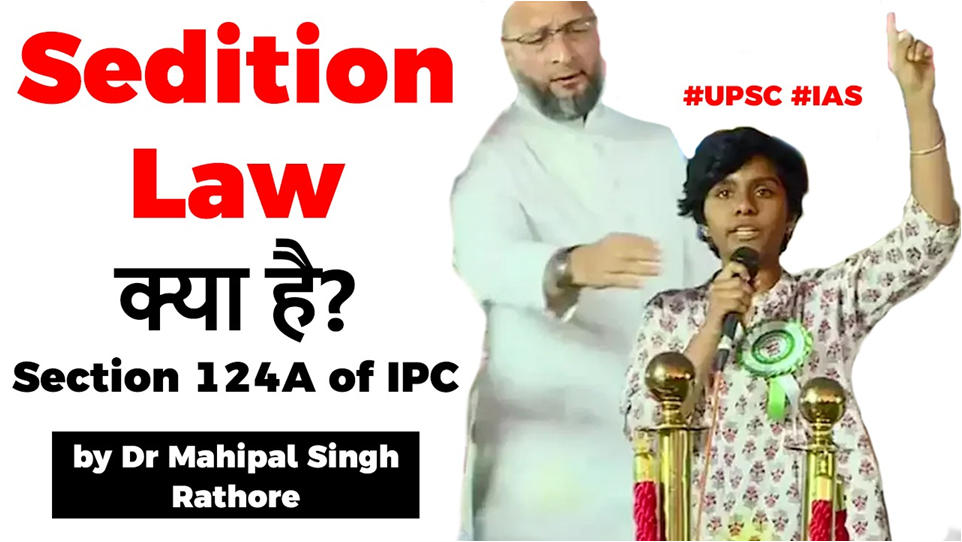Table of Contents



- Sedition
- Conduct or speech inciting people to rebel against the authority of a state.
Section 124A – Sedition Law
- Whoever, by words, either spoken or written, or by signs, or by visible representation, or otherwise, brings or attempts to bring into hatred or contempt, or excites or attempts to excite disaffection towards the Government established by law
- shall be punished with imprisonment for life, to which fine may be added, or with imprisonment which may extend to three years, to which fine may be added, or with fine.
- It is a non-bailable offence
Why was this Law enacted?
- British law – 17th century
- Not part of original IPC 1861
- It was introduced in 1870 after Wahabi revolt.
- The law was famously used against Bal Gangadhar Tilak in 1897 for the first time.
- Later used against many freedom fighters
Right to speech
- Article 19(1)(a) All citizens shall have the right to freedom of speech and expression

Challenge to the sedition law in courts
- In 1951, the Punjab High Court ruled Section 124A to be unconstitutional.
- The validity of the provision itself was upheld by a Constitution Bench in 1962, in Kedarnath singh vs. State of Bihar
- The judgment went into the issue of whether the law on sedition is consistent with the fundamental right under Article 19 (1) (a) which guarantees each citizen’s freedom of speech and expression.
- The Supreme Court laid down that every citizen has a right to say or write about the government, by way of criticism or comment, as long as it does not “incite people to violence” against the government established by law or with the intention of creating public disorder.
- The judgement upheld the constitutionality of sedition, but limited its application to “acts involving intention or tendency to create disorder, or disturbance of law and order, or incitement to violence”.
- It distinguished these from “very strong speech” or the use of “vigorous words” strongly critical of the government.
Balwant Singh vs State of Punjab 1995
- This case was regarding raising of slogans by three men after former Prime Minister Indira Gandhi was assassinated.
- The SC then ruled that “casual raising of slogans, once or twice by two individuals alone cannot be said to be aimed at exciting or attempt to excite hatred or disaffection by the government”.
- The expression “disaffection” includes disloyalty and all feelings of enmity.
- Comments expressing disapproval of the measures of the Government with a view to obtain their alteration by lawful means, without exciting or attempting to excite hatred, contempt or disaffection, do not constitute an offence under this section.
- Comments expressing disapprobation of the administrative or other action of the Government without exciting or attempting to excite hatred, contempt or disaffection, do not constitute an offence under this section.
Does Independent India need a British era Sedition law?
- Rights activists say the law has been used to suppress dissent in India particularly against marginalised communities and minorities.
- Almost every Government has used it against dissenters.
- In 2012-2013, sedition law was slapped on thousands of people protesting against Kudankulam Nuclear Power Plant in Tamil Nadu
Used as a tool to harass dissenters?
- In past two years more than 10,000 tribal farmers in Jharkhand were accused of sedition in 19 police cases for opposing acquisition of lands for so-called developmental projects.
- Hundreds of cases of Sedition against Anti CAA protestors in Uttar pradesh.
- Courts view sedition as a serious offence, making it harder for the accused to secure bail, even if booked only for a speech offence.
- The process of a long-drawn trial then becomes the punishment
Low Conviction Rate
- The number of sedition cases nearly doubled between 2015 and 2018, according to NCRB data.
- Between 2016 and 2018, 332 people were arrested under the sedition provision, but only seven were convicted.
- Lawyers point out that the problem is not the conviction, but opposition to the government is termed “anti-national”, making it easier for the police to make arrests citing any protests as a threat to national security.
Relevance of Sedition Law
- Individual autonomy is the foundation of freedom.
- Freedom of speech – extent to which the State can regulate individual conduct?
- The constitution of India prescribes reasonable restrictions in Article 19(2)
- Interests of the sovereignty and integrity of India, the security of the State, friendly relations with foreign States, public order, decency or morality or in relation to contempt of court, defamation or incitement to an offence.
- Sedition law helps the government to curb secessionist movement and other ANTI NATIONAL propaganda.
Will the law be scrapped?
- While activists have been demanding the repealing of Section 124(A) of the Indian Penal Code that deals with sedition, the government had made it clear in Parliament that it is not taking any steps to repeal the law, saying it is needed to “effectively combat anti-national, secessionist and terrorist” elements.
- “There is no proposal to scrap the provision under the IPC dealing with the offence of sedition. There is a need to retain the provision to effectively combat anti-national, secessionist and terrorist elements,” Minister of State for Home Nityanand Rai in a written reply in Rajya Sabha in July 2019.
Latest Burning Issues | Free PDF






















 WhatsApp
WhatsApp